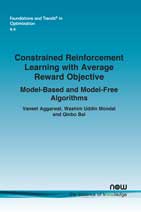Constrained Reinforcement Learning with Average Reward Objective: Model-Based and Model-Free Algorithms
By Vaneet Aggarwal, Purdue University, USA, vaneet@purdue.edu | Washim Uddin Mondal, Indian Institute of Technology Kanpur, India, wmondal@iitk.ac.in | Qinbo Bai, Purdue University, USA, bai113@purdue.edu
Abstract
Reinforcement Learning (RL) serves as a versatile framework for sequential decision-making, finding applications across diverse domains such as robotics, autonomous driving, recommendation systems, supply chain optimization, biology, mechanics, and finance. The primary objective of these applications is to maximize the average reward. Real-world scenarios often necessitate adherence to specific constraints during the learning process.
This monograph focuses on the exploration of various modelbased and model-free approaches for Constrained RL within the context of average reward Markov Decision Processes (MDPs). The investigation commences with an examination of model-based strategies, delving into two foundational methods – optimism in the face of uncertainty and posterior sampling. Subsequently, the discussion transitions to parametrized model-free approaches, where the primal dual policy gradient-based algorithm is explored as a solution for constrained MDPs. The monograph provides regret guarantees and analyzes constraint violation for each of the discussed setups.
For the above exploration, we assume the underlying MDP to be ergodic. Further, this monograph extends its discussion to encompass results tailored for weakly communicating MDPs, thereby broadening the scope of its findings and their relevance to a wider range of practical scenarios.
Constrained Reinforcement Learning with Average Reward Objective: Model-Based and Model-Free Algorithms
Reinforcement Learning (RL) serves as a versatile framework for sequential decision-making, finding applications across diverse domains such as robotics, autonomous driving, recommendation systems, supply chain optimization, biology, mechanics, and finance. The primary objective of these applications is to maximize the average reward. Real-world scenarios often necessitate adherence to specific constraints during the learning process.
This monograph focuses on the exploration of various model-based and model-free approaches for Constrained RL within the context of average reward Markov Decision Processes (MDPs). The investigation commences with an examination of model-based strategies, delving into two foundational methods – optimism in the face of uncertainty and posterior sampling. Subsequently, the discussion transitions to parametrized model-free approaches, where the primal dual policy gradient-based algorithm is explored as a solution for constrained MDPs.
The monograph provides regret guarantees and analyzes constraint violation for each of the discussed setups. For the above exploration, the authors assume the underlying MDP to be ergodic. Further, this monograph extends its discussion to encompass results tailored for weakly communicating MDPs, thereby broadening the scope of its findings and their relevance to a wider range of practical scenarios.
